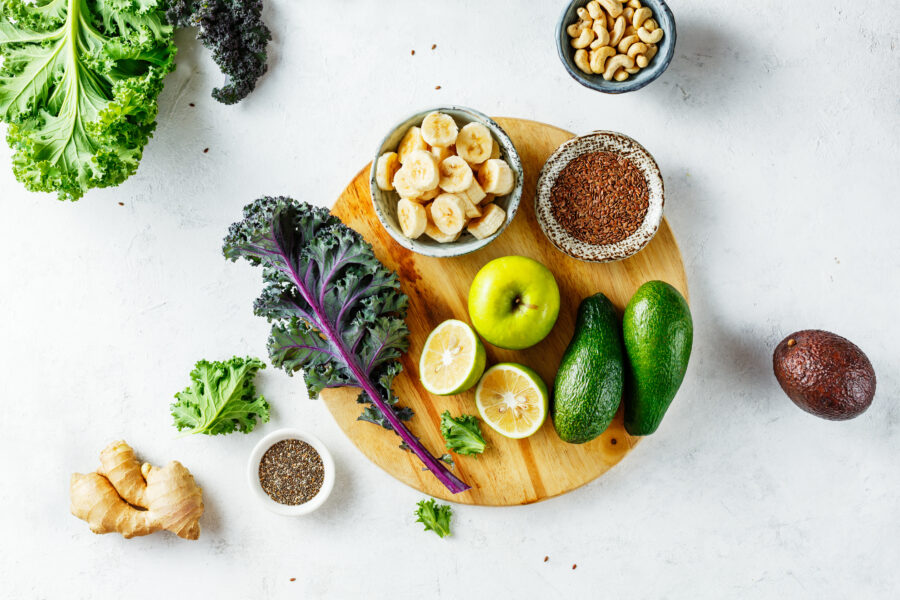“I look six months pregnant,” my friend said, looking sideways in the mirror and frowning. “But you’re not pregnant,” I responded. She proceeded to tell me that every night before she goes to bed, she looks at her round, distended, stomach and then is shocked to see it flat and taut when she wakes up in the morning. “You’re dealing with bloat,” I told my friend and started to explain why this might be happening and what she could do about it.
What Causes Gas and Bloating
Over-eating, eating too fast (and ingesting large amounts of air with poorly chewed food) can cause bloating. So can food sensitivities, particularly with foods containing gluten, the protein component found in products made from wheat. Dairy products are foods that many people will also react to.
Celiac disease, an autoimmune condition caused by a more serious allergy to gluten, produces a more severe reaction than gluten sensitivity. Someone suffering from Celiac disease might experience extreme stomach pain, stomach cramps, and diarrhea. Celiac disease can cause the small intestine to absorb moisture from the stool which could result in constipation.
Constipation can be a common cause of bloating as well. When food is not moving through the digestive system properly, often due to a lack of fiber in the diet, stool stays in the colon longer than it should, giving bacteria “extra” time to ferment which can produce gas (and bloating.) What you eat can have a lot to do with feeling bloated. Artificial sweeteners, hard candies, chewing gum, and carbonated drinks can all contribute to gas and bloating. Even healthy foods like legumes and cruciferous vegetables (broccoli, cabbage, cauliflower, and Brussels sprouts are good examples), can cause gas and bloat for those with digestive issues. Diseases like Crohn’s, an inflammatory condition that affects the gastrointestinal tract, can make it difficult to digest foods containing fiber such as certain vegetables -which can end up causing gas.
Poor Digestion and Bloating
It takes about six to eight hours for food to move through the stomach and small intestine and up to thirty- six hours for it to move all the way through the GI tract. When food is not moving through the digestive system properly, it can, as mentioned, ferment and cause gas.
A common thread with gas and bloating points to slow transit time through the GI tract. A lack of fiber in the diet coupled with inadequate hydration can exacerbate the problem. Waste products move through the large intestine which naturally absorbs water. Without adequate fluids, the large intestine will remove extra water from the stool to utilize elsewhere causing constipation.
Tips to Reduce Gas and Bloating
There are things you can do to avoid this uncomfortable feeling and natural ways to reduce bloating and gas. Food is the best place to start. Foods to reduce bloating include:
- Cucumbers –putting cucumber slices under the eyes can reduce puffiness, and eating them can have a similar effect. Cucumbers contain quercetin, an antioxidant that may help reduce inflammation.
- Asparagus – asparagus is a natural diuretic so it helps flush excess water from the body which helps to relieve bloating. It is also a good source of both soluble and insoluble fiber. Insoluble fiber serves as a food source for beneficial bacteria and can also help reduce constipation.
- Chicken and fish – both are good sources of protein which tends to lower gas and bloating. Look for “pasture-raised” chickens. They enjoy a minimum of 108 sq. ft. per chicken to roam. They’re also antibiotic-free. Look for wild-caught salmon and mackerel (loaded with nutrients and with low mercury levels.) Leaner protein sources (vs. red meat) promote better GI health and contain fewer “bad” bacteria.
- Bananas – high in potassium, bananas can help counteract water retention (and bloating) by regulating sodium which can reduce salt-related bloating. Bananas also have soluble fiber, which can help relieve or prevent constipation.
- Ginger – Ginger contains digestive enzymes that help the digestive system break down protein. This may help food to be digested more easily, reducing the likelihood of gas, bloating, and constipation. Ginger tea is a great option.
Properly digesting food is one of the keys to extracting all the vitamins, minerals, and nutrients present in the foods you eat. No matter how healthy your diet is, if you’re unable to digest the foods you eat, you’ll be unable to benefit from all it has to offer.
Improving Digestion
Digestive Enzymes from MaxLiving is a proprietary blend of digestive enzymes that support the optimal digestion of proteins, fats, and carbohydrates. Taking Digestive Enzymes before meals may be helpful for patients who experience gas and bloating after eating, occasional constipation, or a feeling of fullness even after eating only a small quantity of food. Digestive Enzymes also contain betaine hydrochloride (betaine HCl), a compound used to help the body create stomach acid to break down food.
from MaxLiving is a proprietary blend of digestive enzymes that support the optimal digestion of proteins, fats, and carbohydrates. Taking Digestive Enzymes before meals may be helpful for patients who experience gas and bloating after eating, occasional constipation, or a feeling of fullness even after eating only a small quantity of food. Digestive Enzymes also contain betaine hydrochloride (betaine HCl), a compound used to help the body create stomach acid to break down food.
Using lemon water to reduce bloating can be helpful. Try squeezing the juice of half a lemon into a glass of water, first thing in the morning on an empty stomach. Lemon is alkalizing and contains minerals that help support healthy digestion. It can also help ease heartburn and support healthy bowel function by reducing bloat and encouraging bowel movements.
Other Helpful Ideas
Belly Bloat Detox programs recommend a short-term focus on bloat reduction, typically spanning a three-day period. Using a “food first,” approach, they can be perfect for a special event or to prepare for those wedding photos.
Each morning, begin with a glass of lemon water and stick to three meals a day featuring some of the “low-bloat” foods listed above plus other low-bloat favorites like turkey, avocados, squash, and arugula. Make sure to take your Digestive Enzymes with each meal. If you’re a fan of weight training, you may want to trade in your dumbbells temporarily for cardiovascular work like a brisk walk, bike ride, jog, or a long walk lasting thirty minutes. Aerobic exercise helps push out gas and move food/waste through the digestive system more efficiently.
Home remedies include avoiding drinking out of straws. A good deal of air can be consumed along with the liquid which can add to a bloated stomach. Add gas and bloating to the list of reasons to quit smoking. Inhaling air with smoke (either traditional cigarettes or vaping) can drive air into the GI tract.
Have gas pain? Try placing a hot water bottle or heating pad right over the stomach. The warmth relaxes the muscles surrounding the gut, helping gas to move through the intestines more freely. These are just some of the natural ways to reduce bloating and gas. Implementing these strategies can go a long way toward relieving the discomfort of gas, bloating, and constipation. Give them a try. What do you have to lose? Other than that bloated belly.
About the Author

Jini Cicero is a Los Angeles-based Strength and Conditioning Specialist with a bachelor’s degree in Kinesiology. With over 20 years of experience as a health, fitness, and nutraceutical professional, Jini is passionate about advancing natural medicine and optimal health. Whether she’s working with Hollywood celebrities or cancer patients, Jini uniquely combines exercise science, sports nutrition, and corrective exercise. As a speaker, presenter, and writer, her work has been featured in numerous publications, such as Shape, MindBodyGreen, and The L.A. Daily News.






